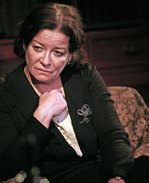SITE GUIDE
SEARCH
REVIEWS
REVIEW ARCHIVES
ADVERTISING AT CURTAINUP
FEATURES
NEWS
Etcetera and
Short Term Listings
LISTINGS
Broadway
Off-Broadway
NYC Restaurants
BOOKS and CDs
OTHER PLACES
Berkshires
London
California
New Jersey
DC
Connecticut
Philadelphia
Elsewhere
QUOTES
TKTS
PLAYWRIGHTS' ALBUMS
LETTERS TO EDITOR
FILM
LINKS
MISCELLANEOUS
Free Updates
Masthead
Writing for Us
A CurtainUp  London Review
London Review
 London Review
London ReviewMrs Klein
|
The envelope looks as if it is about to burst with hostile matter.— Melanie Klein
|

Clare Higgins as Melanie Klein (Photo: John Haynes) |
Wright's play is an erudite combination of a story of family rivalry with plenty of references to the study of psychoanalysis which forms the professional background of all three of the play's women characters. Such is the overriding importance of the world of the psychoanalyst in this play that we hear that Mrs Klein has had a taxi ride where the taxi driver has consulted her on his sexual problems with his new wife.
The opening act sees a very nervous Jewish arrival from Germany, Paula (Nicola Walker), a junior analyst who is trying to make ends meet with a practice in a deprived area of Bethnal Green, the only place the British Psychoanalytic Society will allow her to see patients. Melanie Klein will employ the deferential Paula to type and proof read a German edition of her latest book while she goes to her son's funeral. Mrs Klein is talking about her professional rivalry with Edward Glover and Dr Schmideberg. It is only later that we realise that the hated Dr Schmideberg is Klein's own married daughter Melitta.
While Klein is away, Melitta storms into the house and interrupts Paula, anxious to find the key to the cocktail cabinet. Hoping that her mother is away, Melitta has come to retrieve a letter she had written to her mother and which she has thought better of. Melitta confides in Paula but Mrs Klein arrives home unexpectedly and there is a sudden shift of attention. Mrs Klein starts being unpleasant to Paula and is all over her daughter like a rash. Eventually, the crux of the mother-daughter is brought out in the open and we get a picture of a mother who has tightly controlled her children. When Melitta confronts her mother with her plans for breaking free of this control, sparks fly. The confrontation also has its effect on Paula 's relationship with Mrs. Klein.
Clare Higgins is a remarkable actress, here as the founder of child psychoanalysis who may be brilliant in her chosen profession but who cannot fathom her own daughter. Zoê Waites is stubborn and determined as Melitta and pale-eyed Nicola Walker reveals an ability to ingratiate herself with both women.
I loved the way these women analysts talk to each other never missing an interpretative trick, an allusion to sex or excreta or the infant projecting his anger onto the breast which is the opportunity for the audience to laugh. Even Melitta's request to buy her mother out of the Sunbeam car that was her dead father's, Mrs Klein mentions, is seen as a desire for her father's penis extension. I can remember a time in the 1960s and 70s when many rich people needed to see their analyst four times a week and psychoanalysis was the height of fashionable coping. My guess is that a large percentage of the Almeida audience today for Mrs Klein are in the psychiatric/counselling professions and that some will be admirers of Klein's work. Let's hope Mrs Klein managed to see her daughter with a clinical detachment rather than just as a mother who loves.
Thea Sharrock's tense production is excellent at bringing out the volatility of the cross-over professional-personal relationships. Tim Hatley's elegant study has painted red walls and ceiling, Persian rugs and red velvet curtains like a cosy womb.
|
Subscribe to our FREE email updates with a note from editor Elyse Sommer about additions to the website -- with main page hot links to the latest features posted at our numerous locations. To subscribe,
E-mail: esommer@curtainup.comesommer@curtainup.com
put SUBSCRIBE CURTAINUP EMAIL UPDATE in the subject line and your full name and email address in the body of the message -- if you can spare a minute, tell us how you came to CurtainUp and from what part of the country. |
| Mrs Klein
Written by Nicholas Wright Directed by Thea Sharrock Starring: Clare Higgins, Nicola Walker, Zoè Waites Design: Tim Hatley Lighting: Neil Austin Sound: Ian Dickinson Running time: Two and a half hours with one interval Box Office: 020 7359 4404 Booking to 5th December 2009 Reviewed by Lizzie Loveridge based on 30th October 2009 performance at the Almeida Theatre, Almeida Street, London N1 (Tube: The Angel, Islington) |
|
REVIEW FEEDBACK Highlight one of the responses below and click "copy" or"CTRL+C"
Paste the highlighted text into the subject line (CTRL+ V): Feel free to add detailed comments in the body of the email . . . also the names and emails of any friends to whom you'd like us to forward a copy of this review. |
|
London Theatre Tickets Lion King Tickets Billy Elliot Tickets Mighty Boosh Tickets Mamma Mia Tickets We Will Rock You Tickets Theatre Tickets |




